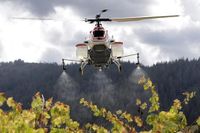Aerial pesticide spraying is making a comeback in France following the recent passage of a new legislative bill by Parliament. On April 9, 2025, lawmakers definitively adopted the bill aimed at enhancing the treatment of diseases affecting plant crops through the use of remotely piloted aircraft, or drones. This significant move opens the door for the application of certain pesticides on specific crops, particularly in challenging terrains.
The legislation specifically targets steep plots with slopes exceeding 20%, mother vine rootstocks, and all banana plantations located primarily in the French overseas territories of Guadeloupe and Martinique. Under the new law, the use of drones is restricted to biocontrol products, which include pheromones and microorganisms, as well as substances permitted in organic farming and pesticides classified as "low risk" by European regulations.
The bill received overwhelming support in the Sénat, following its initial adoption by the Assemblée Nationale in late January 2025, where it faced opposition from most left-wing lawmakers. Henri Cabanel, a Socialist lawmaker and the bill's rapporteur in the Sénat, noted that the legislation primarily affects vineyards in regions such as Beaujolais, Alsace, and Pyrénées-Orientales.
Jean-Luc Fugit, an MP from the presidential party Renaissance and the author of the bill, emphasized the safety and efficiency benefits of using drones for pesticide application. He stated, "On steep terrain, manual application of treatments is arduous and dangerous," highlighting that drones can significantly reduce operator exposure to potentially harmful substances. Fugit also pointed out that drones allow for quicker interventions on hard-to-reach plots and help minimize the volume of substances sprayed.
This legislative change reflects a growing interest in modern agricultural techniques within Europe, particularly as countries seek innovative solutions to enhance crop management while adhering to environmental standards. The move comes amid broader discussions in the European Union regarding pesticide regulations, as the bloc has recently taken steps to ban dozens of toxic substances in toys and is considering the implementation of a carbon levy at key shipping talks.
While the new drone spraying measures have been welcomed by many in the agricultural sector, they also raise questions about the long-term impact on the environment and public health. Critics argue that even low-risk pesticides can have unforeseen consequences, and they call for stringent oversight to ensure that the benefits of drone technology do not come at the expense of safety and sustainability.
As France embraces this technological advancement, it remains to be seen how effectively these measures will be implemented and what implications they will have for the future of agriculture in the country. The success of drone spraying could set a precedent for other nations grappling with similar agricultural challenges, potentially reshaping the landscape of modern farming practices.
The decision to authorize drone spraying also comes at a time when the European Union is grappling with various challenges, including the need for sustainable agricultural practices and the balance between technological innovation and environmental protection. Countries across the EU are increasingly looking to adopt similar measures, reflecting a collective shift towards integrating technology into traditional farming methods.
In the context of these developments, France's initiative to allow drone spraying could serve as a model for other nations. As agricultural demands grow and climate change continues to pose threats to food security, the adoption of drone technology may become a crucial component of modern farming strategies.
In conclusion, the recent legislative changes in France represent a significant step towards modernizing agricultural practices through the use of drone technology. By allowing the controlled application of pesticides in challenging terrains, the French government aims to enhance crop management while adhering to environmental standards. However, as this new approach unfolds, it will be critical to monitor its impact on both agriculture and the environment to ensure a sustainable future for farming in France and beyond.


